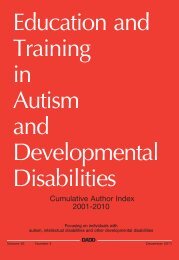Download the Journal (PDF) - Division on Autism and ...
Download the Journal (PDF) - Division on Autism and ...
Download the Journal (PDF) - Division on Autism and ...
Create successful ePaper yourself
Turn your PDF publications into a flip-book with our unique Google optimized e-Paper software.
of <str<strong>on</strong>g>the</str<strong>on</strong>g> assessment or rigor used in determining<br />
incompetency; (b) late notificati<strong>on</strong>s to alleged<br />
wards; (c) lack of participati<strong>on</strong> of (or even <str<strong>on</strong>g>the</str<strong>on</strong>g><br />
presence of) <str<strong>on</strong>g>the</str<strong>on</strong>g> alleged ward; (d) inadequate<br />
independent counsel to serve <str<strong>on</strong>g>the</str<strong>on</strong>g> alleged<br />
ward; (e) <str<strong>on</strong>g>the</str<strong>on</strong>g> frequent assignment of a full<br />
guardian when a partial or limited guardianship<br />
may have sufficed; <strong>and</strong> (f) a lack of m<strong>on</strong>itoring<br />
of annual reports filed by guardians<br />
(both low numbers of reports filed <strong>and</strong> <str<strong>on</strong>g>the</str<strong>on</strong>g><br />
failure to notify or sancti<strong>on</strong> guardians who<br />
failed to file an annual report).<br />
Guardianship <strong>and</strong> individuals with disabilities.<br />
C<strong>on</strong>cerns have also been raised regarding <str<strong>on</strong>g>the</str<strong>on</strong>g><br />
use of guardianship for individuals with disabilities<br />
(e.g., Endicott, 1988; Hoyle & Harris,<br />
2001; Pepper, 1989), <strong>and</strong> possible alternatives<br />
to guardianship have been proposed<br />
(Pierangelo & Crane, 1997; Racino, 1993; Wilber,<br />
1991). As Stancliffe, Abery, Springborg,<br />
<strong>and</strong> Elkin (2000) pointed out, “One of <str<strong>on</strong>g>the</str<strong>on</strong>g><br />
dangers of guardianship is that it can easily go<br />
bey<strong>on</strong>d protecting rights <strong>and</strong> seriously interfere<br />
with self-determinati<strong>on</strong> if guardians exercise<br />
c<strong>on</strong>trol in areas where pers<strong>on</strong>s could<br />
make <str<strong>on</strong>g>the</str<strong>on</strong>g>ir own decisi<strong>on</strong>s or engage in collaborative<br />
decisi<strong>on</strong>-making with support from significant<br />
o<str<strong>on</strong>g>the</str<strong>on</strong>g>rs” (p. 409).<br />
Stancliff et al. (2000) examined levels of<br />
pers<strong>on</strong>al c<strong>on</strong>trol exercised by 76 adults with<br />
mental disabilities, as related to <str<strong>on</strong>g>the</str<strong>on</strong>g>ir guardianship<br />
status. They found that individuals<br />
with no guardian exercised more pers<strong>on</strong>al<br />
c<strong>on</strong>trol over <str<strong>on</strong>g>the</str<strong>on</strong>g>ir lives than did those with a<br />
limited guardian. Similarly, those with a limited<br />
guardian exercised more pers<strong>on</strong>al c<strong>on</strong>trol<br />
than participants with a full guardian.<br />
These significant differences remained, even<br />
when c<strong>on</strong>trolling for competency in self-determinati<strong>on</strong>.<br />
Millar <strong>and</strong> Renzaglia (2002) c<strong>on</strong>ducted an<br />
in-depth analysis of 221 court records of<br />
guardianship hearings for young adults between<br />
<str<strong>on</strong>g>the</str<strong>on</strong>g> ages of 17 <strong>and</strong> 29 with a disability<br />
who were living in <strong>on</strong>e of nine counties in<br />
Michigan. The found <str<strong>on</strong>g>the</str<strong>on</strong>g> following: (a) 120<br />
full guardians <strong>and</strong> 101 partial/limited guardians<br />
were appointed, but distincti<strong>on</strong>s between<br />
<str<strong>on</strong>g>the</str<strong>on</strong>g> powers of <str<strong>on</strong>g>the</str<strong>on</strong>g>se two guardianship types<br />
were often found to be minimal; (b) <str<strong>on</strong>g>the</str<strong>on</strong>g><br />
wards’ primary disability was most often reported<br />
as “mental impairment”; (c) over 50%<br />
of <str<strong>on</strong>g>the</str<strong>on</strong>g> wards in <str<strong>on</strong>g>the</str<strong>on</strong>g> sample were 18 years of<br />
4 / Educati<strong>on</strong> <strong>and</strong> Training in Developmental Disabilities-March 2008<br />
age; <strong>and</strong> (d) over 90% of <str<strong>on</strong>g>the</str<strong>on</strong>g> young adults<br />
were still in public schools at <str<strong>on</strong>g>the</str<strong>on</strong>g> time <str<strong>on</strong>g>the</str<strong>on</strong>g><br />
petiti<strong>on</strong> was filed. In additi<strong>on</strong>, petiti<strong>on</strong>s were<br />
most often filed by family members of <str<strong>on</strong>g>the</str<strong>on</strong>g><br />
wards (74.7%), usually <str<strong>on</strong>g>the</str<strong>on</strong>g> mo<str<strong>on</strong>g>the</str<strong>on</strong>g>r. Mo<str<strong>on</strong>g>the</str<strong>on</strong>g>rs<br />
were <str<strong>on</strong>g>the</str<strong>on</strong>g> <strong>on</strong>es typically appointed as legal<br />
guardians.<br />
Millar (2003) extended <str<strong>on</strong>g>the</str<strong>on</strong>g> findings of Millar<br />
<strong>and</strong> Renzaglia (2002) using <str<strong>on</strong>g>the</str<strong>on</strong>g> same court<br />
files to ask additi<strong>on</strong>al questi<strong>on</strong>s. She found<br />
<str<strong>on</strong>g>the</str<strong>on</strong>g> following reas<strong>on</strong>s for petiti<strong>on</strong>s for guardianship:<br />
to make all decisi<strong>on</strong>s (37.1%), ward is<br />
not capable of making informed decisi<strong>on</strong>s<br />
(33%), specific tasks which <str<strong>on</strong>g>the</str<strong>on</strong>g> ward is unable<br />
to perform (13.5%), to assist <str<strong>on</strong>g>the</str<strong>on</strong>g> ward with<br />
decisi<strong>on</strong> making <strong>and</strong> specific daily living tasks<br />
(16.3%), <strong>and</strong> n<strong>on</strong>e given (1.8%). Millar also<br />
found <str<strong>on</strong>g>the</str<strong>on</strong>g> alleged ward was present at <str<strong>on</strong>g>the</str<strong>on</strong>g><br />
hearing 86.8% of <str<strong>on</strong>g>the</str<strong>on</strong>g> time. If <str<strong>on</strong>g>the</str<strong>on</strong>g> individual<br />
were not present, <str<strong>on</strong>g>the</str<strong>on</strong>g> reas<strong>on</strong> offered was that<br />
attendance would subject <str<strong>on</strong>g>the</str<strong>on</strong>g> individual to<br />
serious physical <strong>and</strong>/or emoti<strong>on</strong>al harm.<br />
In additi<strong>on</strong>, Millar (2003) found that evaluati<strong>on</strong>s<br />
tended to use st<strong>and</strong>ardized <strong>and</strong> normreferenced<br />
intelligence tests. In all 221 court<br />
decisi<strong>on</strong>s, <str<strong>on</strong>g>the</str<strong>on</strong>g> judges stated that “clear <strong>and</strong><br />
c<strong>on</strong>vincing evidence” was provided <strong>and</strong> that<br />
<str<strong>on</strong>g>the</str<strong>on</strong>g> ward was an individual with a developmental<br />
disability <strong>and</strong> required a guardian. Of <str<strong>on</strong>g>the</str<strong>on</strong>g><br />
105 full guardians, 88.2 % had appointments<br />
for an indefinite term. Of <str<strong>on</strong>g>the</str<strong>on</strong>g> 101 limited<br />
guardians, 97% had durati<strong>on</strong>s of five years,<br />
<str<strong>on</strong>g>the</str<strong>on</strong>g> legal limit in <str<strong>on</strong>g>the</str<strong>on</strong>g> state. Thirty-three percent<br />
of <str<strong>on</strong>g>the</str<strong>on</strong>g> wards indicated no preference as<br />
to whom <str<strong>on</strong>g>the</str<strong>on</strong>g>y believed should be appointed<br />
guardian; thirty-two percent indicated <str<strong>on</strong>g>the</str<strong>on</strong>g><br />
same preference as <str<strong>on</strong>g>the</str<strong>on</strong>g>ir petiti<strong>on</strong>er did.<br />
Based up<strong>on</strong> <str<strong>on</strong>g>the</str<strong>on</strong>g>se findings, Millar (2003)<br />
suggested: (a) changes in <str<strong>on</strong>g>the</str<strong>on</strong>g> way evaluati<strong>on</strong>s<br />
are performed, to include evaluati<strong>on</strong> of adult<br />
daily living skills (including decisi<strong>on</strong> making)<br />
<strong>on</strong> an <strong>on</strong>going basis throughout <str<strong>on</strong>g>the</str<strong>on</strong>g> guardianship<br />
term; (b) educati<strong>on</strong> for attorneys <strong>and</strong><br />
judges in <str<strong>on</strong>g>the</str<strong>on</strong>g> area of disability, with an emphasis<br />
<strong>on</strong> <str<strong>on</strong>g>the</str<strong>on</strong>g> fact that pers<strong>on</strong>s with disabilities can<br />
<strong>and</strong> do lead quality adult lives when given <str<strong>on</strong>g>the</str<strong>on</strong>g><br />
appropriate support; (c) educati<strong>on</strong> for families<br />
<strong>and</strong> educators related to <str<strong>on</strong>g>the</str<strong>on</strong>g> guardianship<br />
process <strong>and</strong> ramificati<strong>on</strong>s of guardianship impositi<strong>on</strong>,<br />
well before <str<strong>on</strong>g>the</str<strong>on</strong>g> student reaches <str<strong>on</strong>g>the</str<strong>on</strong>g><br />
age of majority, (d) increased participati<strong>on</strong> of<br />
<str<strong>on</strong>g>the</str<strong>on</strong>g> alleged ward in <str<strong>on</strong>g>the</str<strong>on</strong>g> guardianship hearing;<br />
<strong>and</strong> (e) <str<strong>on</strong>g>the</str<strong>on</strong>g> selecti<strong>on</strong> <strong>and</strong> m<strong>on</strong>itoring of
















